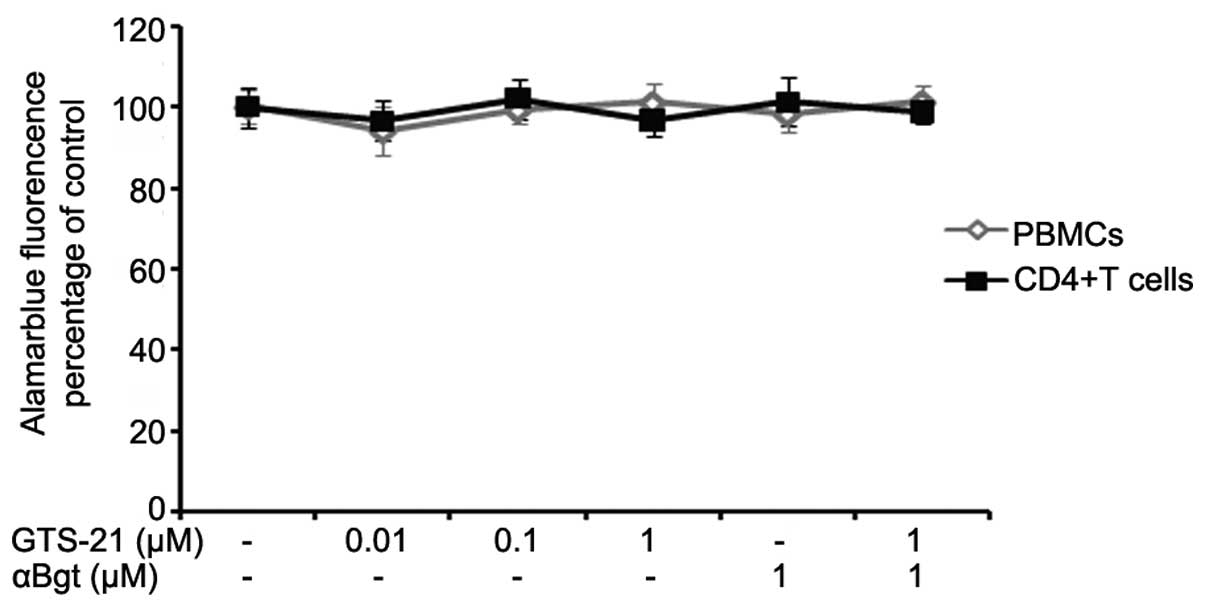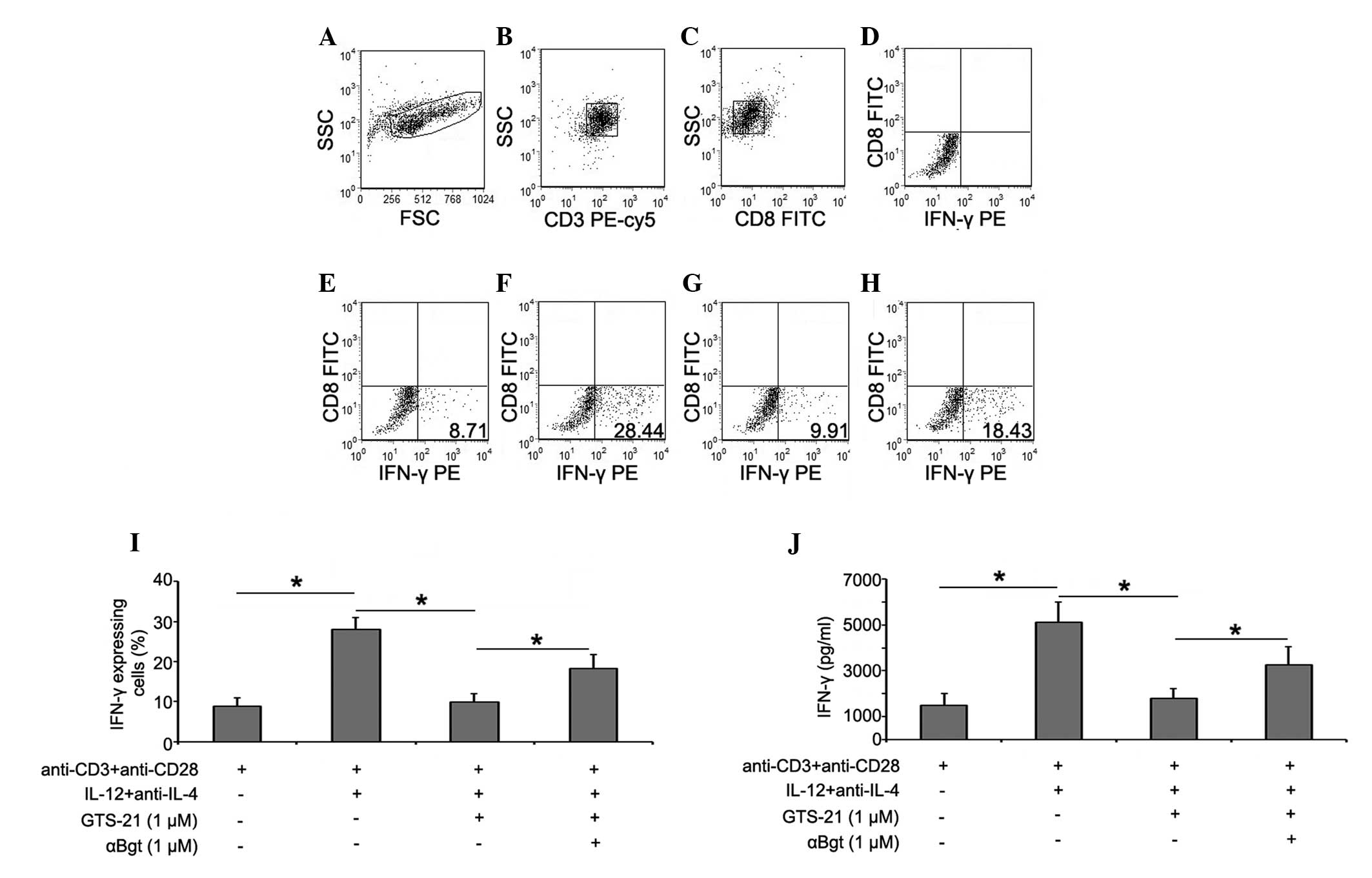|
1
|
Cope AP, Schulze-Koops H and Aringer M:
The central role of T cells in rheumatoid arthritis. Clin Exp
Rheumatol. 25(5 Suppl 46): S4–S11. 2007.PubMed/NCBI
|
|
2
|
Yamada H, Nakashima Y, Okazaki K, et al:
Th1 but not Th17 cells predominate in the joints of patients with
rheumatoid arthritis. Ann Rheum Dis. 67:1299–1304. 2008. View Article : Google Scholar : PubMed/NCBI
|
|
3
|
Cañete JD, Martinez SE, Farrés J, et al:
Differential Th1/Th2 cytokine patterns in chronic arthritis:
interferon gamma is highly expressed in synovium of rheumatoid
arthritis compared with seronegative spondyloarthropathies. Ann
Rheum Dis. 59:263–268. 2000.
|
|
4
|
Nissinen R, Leirisalo-Repo M, Tiittanen M,
et al: CCR3, CCR5, interleukin 4, and interferon-gamma expression
on synovial and peripheral T cells and monocytes in patients with
rheumatoid arthritis. J Rheumatol. 30:1928–1934. 2003.PubMed/NCBI
|
|
5
|
Szabo SJ, Sullivan BM, Stemmann C,
Satoskar AR, Sleckman BP and Glimcher LH: Distinct effects of T-bet
in TH1 lineage commitment and IFN-gamma production in CD4 and CD8 T
cells. Science. 295:338–342. 2002. View Article : Google Scholar : PubMed/NCBI
|
|
6
|
Yang DD, Conze D, Whitmarsh AJ, et al:
Differentiation of CD4+ T cells to Th1 cells requires
MAP kinase JNK2. Immunity. 9:575–585. 1998.
|
|
7
|
Pavlov VA, Ochani M, Yang LH, et al:
Selective alpha7-nicotinic acetylcholine receptor agonist GTS-21
improves survival in murine endotoxemia and severe sepsis. Crit
Care Med. 35:1139–1144. 2007. View Article : Google Scholar : PubMed/NCBI
|
|
8
|
Wang H, Liao H, Ochani M, et al:
Cholinergic agonists inhibit HMGB1 release and improve survival in
experimental sepsis. Nat Med. 10:1216–1221. 2004. View Article : Google Scholar : PubMed/NCBI
|
|
9
|
Wang H, Yu M, Ochani M, et al: Nicotinic
acetylcholine receptor alpha7 subunit is an essential regulator of
inflammation. Nature. 421:384–388. 2003. View Article : Google Scholar : PubMed/NCBI
|
|
10
|
Bruchfeld A, Goldstein RS, Chavan S, et
al: Whole blood cytokine attenuation by cholinergic agonists ex
vivo and relationship to vagus nerve activity in rheumatoid
arthritis. J Intern Med. 268:94–101. 2010.PubMed/NCBI
|
|
11
|
de Jonge WJ and Ulloa L: The alpha7
nicotinic acetylcholine receptor as a pharmacological target for
inflammation. Br J Pharmacol. 151:915–929. 2007.PubMed/NCBI
|
|
12
|
Kitagawa H, Takenouchi T, Azuma R, et al:
Safety, pharmacokinetics, and effects on cognitive function of
multiple doses of GTS-21 in healthy, male volunteers.
Neuropsychopharmacol. 28:542–551. 2003. View Article : Google Scholar : PubMed/NCBI
|
|
13
|
Olincy A, Harris JG, Johnson LL, et al:
Proof-of-concept trial of an alpha7 nicotinic agonist in
schizophrenia. Arch Gen Psychiatry. 63:630–638. 2006. View Article : Google Scholar : PubMed/NCBI
|
|
14
|
Conti-Fine BM, Navaneetham D, Lei S and
Maus AD: Neuronal nicotinic receptors in non-neuronal cells: new
mediators of tobacco toxicity? Eur J Pharmacol. 393:279–294. 2000.
View Article : Google Scholar : PubMed/NCBI
|
|
15
|
Ahmed SA, Gogal RJ Jr and Walsh JE: A new
rapid and simple non-radioactive assay to monitor and determine the
proliferation of lymphocytes: an alternative to [3H]thymidine
incorporation assay. J Immunol Methods. 170:211–224.
1994.PubMed/NCBI
|
|
16
|
O’Brien J, Wilson I, Orton T and Pognan F:
Investigation of the Alamar Blue (resazurin) fluorescent dye for
the assessment of mammalian cell cytotoxicity. Eur J Biochem.
267:5421–5426. 2000.PubMed/NCBI
|
|
17
|
Petersen CM, Christensen EI, Andresen BS
and Møller BK: Internalization, lysosomal degradation and new
synthesis of surface membrane CD4 in phorbol ester-activated
T-lymphocytes and U-937 cells. Exp Cell Res. 201:160–173. 1992.
View Article : Google Scholar : PubMed/NCBI
|
|
18
|
Mascher B, Schlenke P and Seyfarth M:
Expression and kinetics of cytokines determined by intracellular
staining using flow cytometry. J Immunol Methods. 223:115–121.
1999. View Article : Google Scholar : PubMed/NCBI
|
|
19
|
Kox M, van Velzen JF, Pompe JC,
Hoedemaekers CW, van der Hoeven JG and Pickkers P: GTS-21 inhibits
pro-inflammatory cytokine release independent of the Toll-like
receptor stimulated via a transcriptional mechanism involving JAK2
activation. Biochem Pharmacol. 78:863–872. 2009. View Article : Google Scholar : PubMed/NCBI
|
|
20
|
Nizri E, Hamra-Amitay Y, Sicsic C, Lavon I
and Brenner T: Anti-inflammatory properties of cholinergic
up-regulation: A new role for acetylcholinesterase inhibitors.
Neuropharmacology. 50:540–547. 2006. View Article : Google Scholar : PubMed/NCBI
|
|
21
|
Sato KZ, Fujii T, Watanabe Y, et al:
Diversity of mRNA expression for muscarinic acetylcholine receptor
subtypes and neuronal nicotinic acetylcholine receptor subunits in
human mononuclear leukocytes and leukemic cell lines. Neurosci
Lett. 266:17–20. 1999. View Article : Google Scholar
|
|
22
|
McGrath J, McDonald JW and Macdonald JK:
Transdermal nicotine for induction of remission in ulcerative
colitis. Cochrane Database Syst Rev. 18:CD0047222004.PubMed/NCBI
|
|
23
|
van Westerloo DJ, Giebelen IA, Florquin S,
et al: The cholinergic anti-inflammatory pathway regulates the host
response during septic peritonitis. J Infect Dis. 191:2138–2148.
2005.PubMed/NCBI
|
|
24
|
van Maanen MA, Lebre MC, van der Poll T,
et al: Stimulation of nicotinic acetylcholine receptors attenuates
collagen-induced arthritis in mice. Arthritis Rheum. 60:114–122.
2009.PubMed/NCBI
|
|
25
|
Li T, Zuo X, Zhou Y, et al: The vagus
nerve and nicotinic receptors involve inhibition of HMGB1 release
and early pro-inflammatory cytokines function in collagen-induced
arthritis. J Clin Immunol. 30:213–220. 2010. View Article : Google Scholar : PubMed/NCBI
|


















